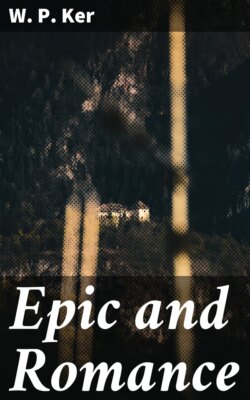Читать книгу Epic and Romance - W. P. Ker - Страница 10
На сайте Литреса книга снята с продажи.
Epic and Romance
ОглавлениеTable of Contents
| The complex nature of Epic | 16 |
| No kind or aspect of life that may not be included | 16 |
| This freedom due to the dramatic quality of true (e.g. Homeric) Epic as explained by Aristotle | 17 17 |
| Epic does not require a magnificent ideal subject such as those of the artificial epic (Aeneid, Gerusalemme Liberata, Paradise Lost) | 18 18 |
| The Iliad unlike these poems in its treatment of "ideal" motives (patriotism, etc.) | 19 |
| True Epic begins with a dramatic plot and characters | 20 |
| The Epic of the Northern heroic age is sound in its dramatic conception and does not depend on impersonal ideals (with exceptions, in the Chansons de geste) | 20 21 |
| The German heroes in history and epic (Ermanaric, Attila, Theodoric) | 21 |
| Relations of Epic to historical fact | 22 |
| The epic poet is free in the conduct of his story but his story and personages must belong to his own people | 23 26 |
| Nature of Epic brought out by contrast with secondary narrative poems, where the subject is not national | 27 |
| This secondary kind of poem may be excellent, but is always different in character from native Epic | 28 |
| Disputes of academic critics about the "Epic Poem" | 30 |
| Tasso's defence of Romance. Pedantic attempts to restrict the compass of Epic | 30 |
| Bossu on Phaeacia | 31 |
| Epic, as the most comprehensive kind of poetry, includes Romance as one of its elements but needs a strong dramatic imagination to keep Romance under control | 32 33 |
